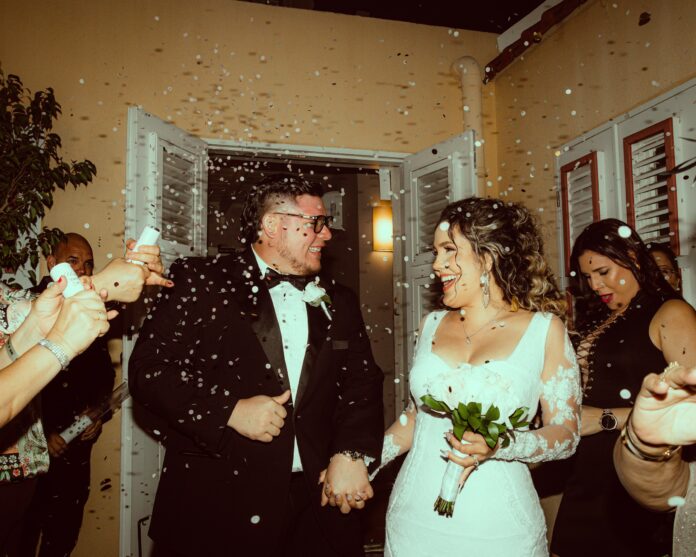‘Cocktails, dinner and dancing to follow’. These are the six words that every wedding guest hopes to see on an invitation. And let’s be honest; ‘and’, ‘to’ and ‘follow’ aren’t doing much of the heavy lifting here.
Indeed, it could be said that if you get these three key components of any successful wedding reception nailed, then the only people forgetting your wedding reception will be those who went in too hard on the open bar.
There’s been enough talk on these pages about wedding food and drink before. Today, we’re considering the all important third component; music. You know, the stuff that gets your guests moving, grooving, noodlin’ and canoodling.
We choose those words a little more carefully than simply because they rhyme. Sure, you want upbeat, dancefloor fillers that get everyone grooving. But you also want the 80s hair metal that has guests playing air guitar, ties torn off and turned into headbands. And of course, there’s got to be a few slow dances…this day is all about romance, after all.
Today, we’re exploring how to choose the IDEAL music for your wedding day. Let’s sashay over to the dancefloor and get stuck in…
Deciding Between A Band, DJ Or An iTunes Playlist
Wedding reception songs can be performed by professional bands, spun by DJs, or simply delivered via an iTunes or Spotify playlist, as is becoming increasingly popular.
You can support local bands and hire them to play at your wedding. As a safe choice, it is best to opt for bands that have experience in playing weddings, specifically. A DJ can also be a good option. They are experts who can play music suitable for the changing vibes of each wedding setting, feeling the atmosphere of the dancefloor and responding accordingly.
Whether opting for a band or a DJ, it is essential to discuss with them the different genres of music you’d like to be played at the wedding. Some may insist on having autonomy on the setlist – we’d recommend steering clear of this level of tyranny. It’s your big day after all!
Most wedding bands will specialise in a preferred genre, whether that’s 60s Motown, UK garage, or modern day indie rock singalongs. Some may even specify the bands they cover, which can be really useful if you’re looking to exercise some control over your wedding band’s setlist. If we’re dealing in broad brushstrokes only, perhaps you might expect tracks from The Killers, Arctic Monkeys, Sam Fender, Foo Fighters, Green Day, Blur, Oasis and more. If those indie rock singalongs we mentioned are your thing, this level of precision is ideal.
Regardless of whether you’ve chosen a live band or DJ, you’ll need to give them a detailed itinerary of the running order of the day. From the arrival of guests to the event, all the way to the reception and cocktail hour, you have to provide them with a precise schedule so they can tailor their music appropriately. Obviously, this doesn’t apply to your own curated iTunes or Spotify playlist, which is a more affordable option, and one which you have complete control over.
The main advantage of playing music solely by your own compilation is that it gives the soon-to-be spouses more control over the music. Moreover, it is an inexpensive method, as you do not need to splurge on bands or DJ. However, it does take time and thorough planning when deciding on the songs – sometimes, delegating this task can relieve a fair amount of pre-wedding stress.

The Best Of Both Worlds
Perhaps the ideal compromise here is to opt for a customised playlist for some sections of the event, and either a DJ or a musician for those key moments that will be captured in everyone’s memory, such as the walk down the aisle and the first dance.
Bands and DJs usually charge hourly, so you can reduce the costs and also have more control of the songs when you play your playlist at the beginning of the event, in the background whilst the photography takes place and during the wedding breakfast, letting the musicians take over during the wedding reception and special dances. This will clearly indicate when you want the dancefloor to fill up and the party to get a little raucous.
Assess The Necessary Sound Equipment
Whether you are playing a customised song compilation or hiring a professional musician, the sound needs to be crisp and impeccable. No wedding reception ever caught flight with a buffering connection or fuzzy sound quality.
Whilst some venues may already have a capable sound system, in most cases, you will likely need to hire speakers. Fortunately, your DJ or wedding band will usually offer this as part of their package, but if you’re managing the music yourself via a playlist, this is something you’ll have to take care of.
That said, the right PA system for your needs may well differ from the venue’s choice, so it’s worth discussing this with your suppliers even if the venue claims to have everything covered. For instance, a system perfect for intimate speeches in a cosy barn setting might struggle to deliver the bass-heavy punch needed when your evening guests arrive and the dancefloor fills up.
It is crucial to test the sound system the night before to make sure that the songs can be played seamlessly, the volume is correct, and the acoustics are clear, crisp and audible. You can also delegate this assessment task to one of the groomsmen or bridesmaids, if you like.
Test The Playlist Before The Big Day
It is wise to preview the playlist a day before to ensure that all the songs are suitable in all proceedings of the wedding. Listening to the songs beforehand will help you to find any awkward transitions or pauses that went unnoticed, or a jarring shift from Slipknot to Sinatra that will have the dancefloor scratching their heads then heading to the bar…

Maintaining Balance In The Beats
It is important to maintain balance in your wedding playlist. The beats should be compatible with the emotions and energy of each section of the wedding. For instance, you do not want a DnB banger being played when you are exchanging vows (unless that is what you want, actually).
Many wedding playlist gurus (is that an actual job?) suggest following the rule of thumb of playing one slow song after every four upbeat danceable songs. This way, everyone can enjoy both the romantic and rowdy sides of the wedding.
Alternatively, if you’re hiring a band, it’s a good idea to first check the style of music they specialise in; does anyone want to hear an original song that they can’t sing along to at a wedding? We think not.
The Bottom Line
Music plays a key role in commemorating this amazing milestone, and arriving at a suitable playlist is a vital part of wedding planning. If you have trouble deciding what to play, simply follow your heart and opt for songs that you like. After all, this is your day, and if music is a big part of your life and love, cherish those songs that are special to you!
Now, can we expect our invite in the post?





